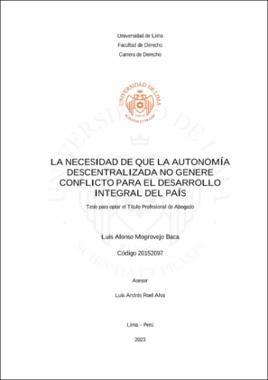La necesidad de que la autonomía descentralizada no genere conflicto para el desarrollo integral del país

View/
Tesis
(application/pdf: 761.4Kb)
(application/pdf: 761.4Kb)
Autorización
(application/pdf: 207.0Kb)
(application/pdf: 207.0Kb)
Reporte de similitud
(application/pdf: 23.50Mb)
(application/pdf: 23.50Mb)
Date
2023Author(s)
Advisor(s)
Metadata
Show full item recordAbstract
Decentralization is a process established in the Political Constitution of Peru, which makes it possible to extend the representation of the unitary state in the country throughout its territory. The constitutional history of Peru, there have been attempts to implement different forms of political organization. During the 19th century, an attempt was made to establish a unitary government, despite the great conflicts of representation that still existed due to the remnants of Spanish dependence. In view of this, there was a proposal to convert it into a federated state, but it did not have a great impact, so that to date it has been consolidated as unitary, decentralized and deconcentrated. In spite of this, Peru is a very politically divided country and we have more than a thousand burgomasters, considering that the territory is only divided into twenty-four regions and one constitutional province. In this sense, the present research work seeks to analyze a way to synthesize the number of provincial and district municipalities through historical methods; in addition, to establish an organizational hierarchy for each level of government, with the purpose of achieving an integral development of the country with a sociological and functional legal method, which is the main objective of this process. La descentralización es un proceso establecido en la Constitución Política del Perú, que permite extender la representación del estado unitario que se tiene en el país, a lo largo de todo su territorio. En la historia constitucional del Perú, se ha tratado de implementar distintas formas de organización política. Durante el siglo XIX, se intentó establecer un gobierno unitario, a pesar de los grandes conflictos de representación que aún se tenía por los rezagos de la dependencia española. Ante ello, hubo una propuesta de convertirlo a un estado federado, pero no tuvo gran impacto, por lo que a la fecha se consolidó en que sea unitario, descentralizado y desconcentrado. A pesar de ello, el Perú es un país muy dividido políticamente y tenemos más de mil burgomaestres, considerando que el territorio se divide únicamente en veinticuatro regiones y una provincia constitucional. En ese sentido, el presente trabajo de investigación busca analizar una forma de sintetizar la cantidad de municipalidades provinciales y distritales mediante métodos históricos; además, establecer una jerarquía organizacional para cada nivel de gobierno, con la finalidad de lograr un desarrollo integral del país con un método jurídico sociológico y funcional, que es el objetivo principal de este proceso.
How to cite
Mogrovejo Baca, L. A. (2023). La necesidad de que la autonomía descentralizada no genere conflicto para el desarrollo integral del país [Tesis para optar el título profesional de Abogado, Universidad de Lima]. Repositorio institucional de la Universidad de Lima. https://hdl.handle.net/20.500.12724/19029Publisher
Universidad de LimaSubject
Collections
- Tesis [79]
The following license files are associated with this item:

